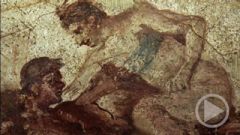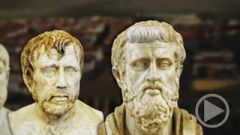Any Gods Will Do – But the Emperor’s a Must: Religion
Any Gods Will Do - But the Emperor's a Must Religion
The state religion is what holds Roman society together. The ceremonies performed on countless holidays are public occasions. They often begin with splendid processions. Here carpenters are carrying a shrine through the city - with a model of their work. On the far left is the characteristic shield of Minerva. She is the patron goddess of craftsmen. The procession is heading to her temple in the middle of the Forum.
The town's main temple was dedicated to the three mightiest gods - Jupiter, the father of the gods, his wife Juno, protector of birth and marriage - and Minerva the goddess of wisdom. She was the patron of craftsmen as well as poets and teachers . Statues of the gods once stood in niches on the back wall of the temple. Around them lay offerings with which the Pompeian worshippers hoped to gain the favor of the gods. Perhaps the carpenters' model ended up here.
In Roman religion, the ceremonies do not take place in the temples, but at the altar in front - the most important ritual being animal sacrifices. The priest is wearing a white toga which he has pulled on over his head. From the right, bare-chested slaves bring the sacrificial bull to the altar.
The innards of the slain animal are used by specially trained priests to tell the future. A portion of the meat is burned at the altar and the rest is distributed among the population - which strengthens their sense of community. Care is taken to carry out all rituals in the traditional manner. Any change would shake society to its foundations.
The imperial cult was also part of the state religion. Was the emperor a god? That seemed plausible to Romans. In their mythology the boundary between the human world and the world of the gods was a flowing one. Many a hero became immortal - like Hercules, here being led into Olympus by Juno and Minerva. And surely, the emperor with his great power was literally "superhuman"? Ultimately, the imperial cult also served to unify the people, to make them identify with their state.
Prof. Karl-Wilhem Weeber, Wuppertal/Witten:
"In honouring the emperor one was honouring oneself. Wishing the best for the emperor - as the highest man in this state - was wishing oneself all the best. I can say 'I have to wish the best for the man at the top so that he can best govern his empire - which is also my empire.' So all those wishes - 'we wish the emperor all the best' - develop into a kind of personality cult."
This is where the statue of Augustus once stood - in the College of the "Augustales" in Herculaneum. The members of this order were in charge of the imperial cult of Augustus - and many of them were freedmen. As former slaves were barred from holding political posts, the cult provided a prestigious way of giving them a role in civic life.
But religion is not confined to the big public temples. Every house has a small altar, where families make sacrifices to the household gods. The deities are present in the shape of small statues. The Penates are the patron gods of the house, and the Lares are the ancestors' sprits. Worshippers ask them to pour wealth over the family from their cornucopia. For that they receive offerings of eggs, fruit or pinecones - all fertility symbols. And at every meal, a portion is thrown into the hearth for them. Even more important is the genius of the pater familias. That is his divine spirit, often represented by a snake. The official state religion has few answers for some big questions - such as the fear of death. Many people seek help from foreign gods. A highly popular cult is that of the mysterious Isis. In Egyptian religion she is the wife of Osiris, the god of the dead. After Osiris is murdered and dismembered by his brother, Isis collects the pieces of his corpse, recalls him to life and conceives with him the god Horus. For that reason she is revered as the conqueror of death - by many Romans as well.
Not a problem for the state. As long as people do not contradict the official religion they may worship whatever gods they like. In fact, the Roman pantheon often absorbs the deities of conquered peoples - that encourages their loyalty to Rome. Besides, you never know - insulting the wrong god could have nasty results.
Here, too, we see the altar in front of the temple. The small shed contains steps leading underground. Ritual cleansings take place beneath the altar. These kinds of private religious ceremonies are called "mystery cults". They harbour secrets that are only revealed to believers. Consequently, the Isis temple was not accessible to the public - only a single door leads into the sanctum. The famous frescoes in the Villa dei Misteri also seem to be related to a mystery cult. So far, no one is entirely sure what they depict, but a central role is played by the god Bacchus - known as Dionysos in Greek.
First, women appear to be preparing for a ceremony. One of them is probably a priestess. Next come members of Dionysos's traditional retinue: a satyr, a demon with a lyre - and two goatherds. The central scene shows Dionysos himself in the arms of his bride Ariadne. He is the deity of rough, wild nature, of intoxication and ecstasy, of fertility and sex. That is what the young woman in this picture is preparing herself for: she is combing her tresses into a traditional wedding hairstyle. Are these frescoes about the initiation of a bride?
Romans view weddings as private events. Marriages are not carried out by public priests. Usually the bride is brought in a solemn procession to the home of her husband. There is a banquet - and as long as the couple lives together they are married.
On the whole, the Romans had an uninhibited attitude toward sexuality, viewing it as part of daily life - as demonstrated by countless pictures, sculptures and pieces of graffiti.







